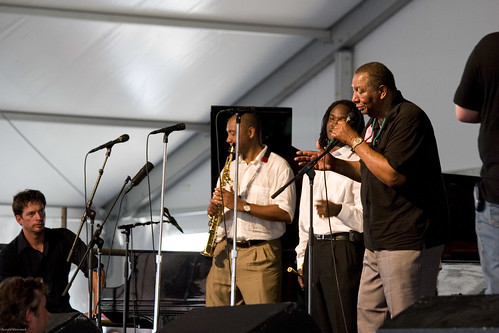I was pleasantly surprised to see an article in the current Living Blues of John Jackson's nephew. Jeff Scott, having had the pleasure of seeing him perform several times. He is one of a number of artists who frequented the Archie Edwards Blues Foundation's jam sessions when they were held at the Bunker Hill Road address that housed Archie's Barber Shop. One thing I recall was how much like his uncle he was in performance, even telling similar style of jokes. At the time, Jeff had a wonderful self-produced CD, Rattlesnake Daddy, that I reviewed for the DC Blues Society's newsletter, the DC Blues Calendar in November 2001. I believe I purchased this CD but I do not believe it is currently available. Hopefully with the renewed attention to Jeffrey's music from the Living Blues article it will be reissued.
With John Jackson as his uncle, and friends with the likes of John Cephas and Doc Watson, one should not be surprised that the debut album of Jeffrey Scott, the self-produced Rattlesnake Daddy is firmly in the East Coast finglestyle guitar tradition. This disc contains a selection of songs from Blind Blake, Blind Boy Fuller, Arthur Crudup and Big Bill Broonzy among others, Scott displays a crisp, fluid guitar style while his tenor is a bit brighter sounding than John Jackson’s straightforward delivery of a lyric. Perhaps he is not yet as deft a guitarist as his uncle or John Cephas, but he does maintain a nice relaxed groove on Step It Up and Go as well as That’s All Right Mama. This is a very enjoyable disc, and indicates Scott is a talent with more than simply promise here.
Here is a short video clip of Jeffrey Scott performing.
With John Jackson as his uncle, and friends with the likes of John Cephas and Doc Watson, one should not be surprised that the debut album of Jeffrey Scott, the self-produced Rattlesnake Daddy is firmly in the East Coast finglestyle guitar tradition. This disc contains a selection of songs from Blind Blake, Blind Boy Fuller, Arthur Crudup and Big Bill Broonzy among others, Scott displays a crisp, fluid guitar style while his tenor is a bit brighter sounding than John Jackson’s straightforward delivery of a lyric. Perhaps he is not yet as deft a guitarist as his uncle or John Cephas, but he does maintain a nice relaxed groove on Step It Up and Go as well as That’s All Right Mama. This is a very enjoyable disc, and indicates Scott is a talent with more than simply promise here.
Here is a short video clip of Jeffrey Scott performing.























